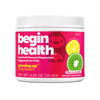Is Your Kid's Hydration Drink Missing Key Minerals?
share this article

Hydration isn’t just about water. For kids, staying well-hydrated means more than just drinking enough,it also means getting the right balance of minerals that help their bodies absorb and use that water effectively.
Many popular “kid-friendly” hydration drinks are packed with sugar or artificial flavors, but miss the mark on the minerals that matter most: magnesium, potassium, and sodium. Here’s how to tell if your kid’s drink is doing its job, or just a sweet distraction.
What Minerals Do Growing Kids Need for Proper Hydration?
When your kiddo sweats, pees, or even breathes, they lose electrolytes—minerals that help regulate fluid balance, nerve signals, and muscle function. Replenishing those is especially important during hot weather, after sports, or if they’re dealing with digestive issues like constipation.
The key minerals to look for:
-
Magnesium: Helps muscles relax, supports regular poops, and contributes to overall electrolyte balance
-
Potassium: Keeps cells hydrated and supports normal heart, muscle, and nerve function
-
Sodium: Helps the body retain and balance fluids—especially important during intense activity or heat
Without these, your little one might drink lots of water but still feel sluggish, constipated, or dehydrated.
The Problem with Many “Kid Hydration” Drinks
Many hydration drinks marketed for kids fall short where it matters. Here’s why:
-
Too much sugar: Many contain as much as 15–20 grams per serving—about the same as a soda. This can cause blood sugar crashes and contribute to poor gut health.
-
No meaningful minerals: Some are mostly flavored water with little to no magnesium or potassium.
-
Artificial dyes and sweeteners: These can irritate the gut or contribute to behavioral issues in sensitive kiddos.
If your kid’s drink isn’t replacing what’s lost—or worse, creating new imbalances—it’s not helping.
How to Choose a Better Hydration Drink for Your Kid
Look for options that include:
-
Magnesium: 40–60 mg per serving is appropriate for most kids 1–8 years old
-
Potassium: At least 100–200 mg per serving
-
Sodium: A small amount (100–200 mg) can support fluid retention when needed
-
No added sugar or only naturally sweetened with monk fruit or fruit extracts
-
No artificial colors or preservatives
Begin Health Note:
Try Growing Up Magnesium by Begin Health. It’s mineral hydration mix made just for kids, with magnesium citrate and glycinate, potassium, and prebiotic fiber. It helps support hydration, digestion, and regularity, without added sugars or artificial flavors.
When to Use a Hydration Drink
You don’t need a hydration supplement every day, but they’re helpful during:
-
Hot days or outdoor play
-
Intense physical activity or sports
-
Constipation or hard stools
-
Illness with vomiting or diarrhea
-
Travel days or dry airplane environments
Summary
If your kid’s hydration drink doesn’t contain minerals like magnesium and potassium, it may not be doing much to support true hydration or gut health. The right electrolyte balance is key—especially for active kiddos, picky eaters, or those prone to digestive issues. Read the label carefully and choose hydration options that nourish beyond just water.
















